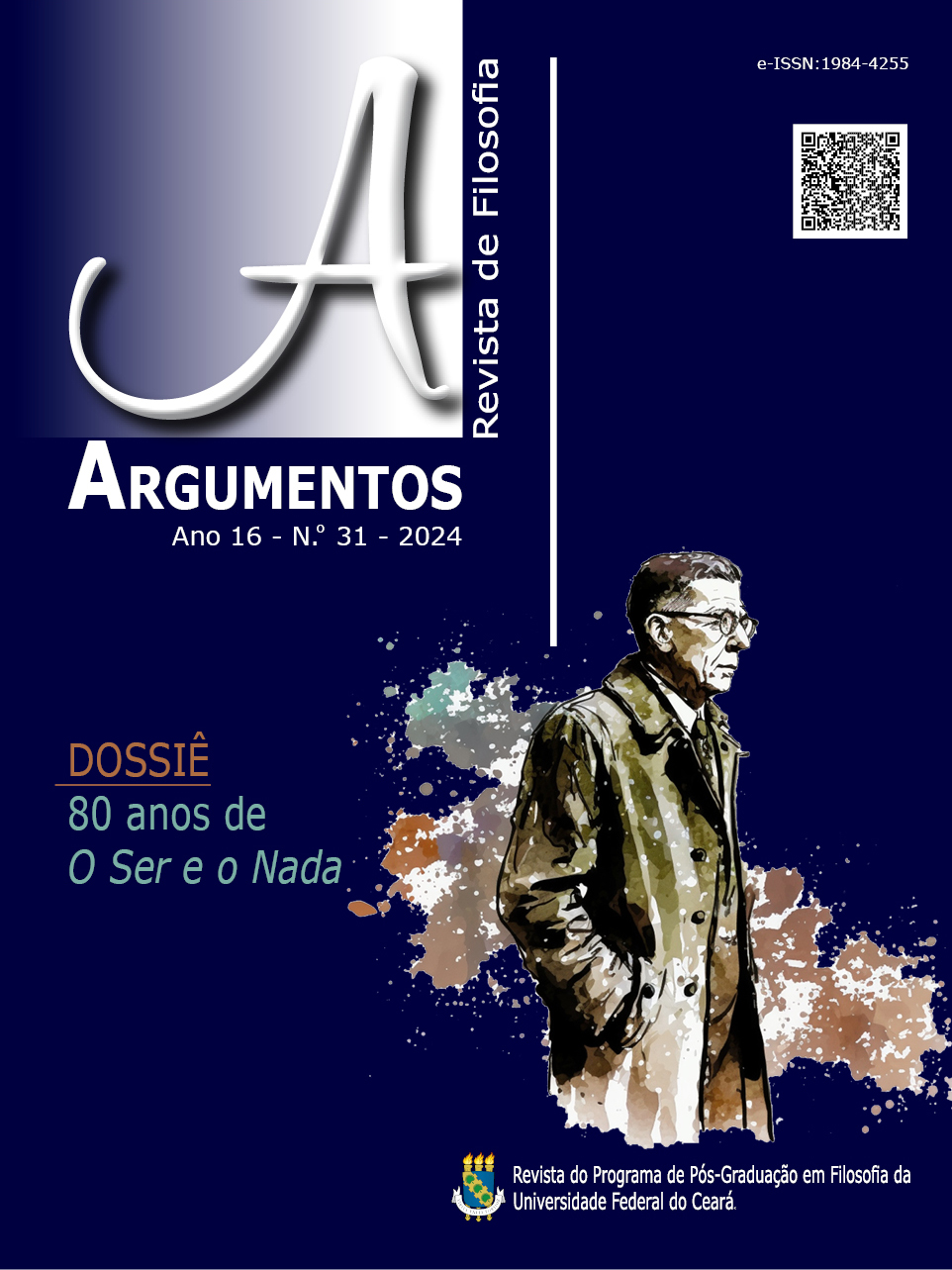Being and Nothingness and metaphysical liberation: first task of the philosophy of freedom
DOI:
https://doi.org/10.36517/Argumentos.31.5Keywords:
Being and Nothingness. Liberation. Metaphysics. Sartre.Abstract
The philosophy developed by Sartre is the philosophy of freedom. This is confirmed by his work, whether in literary or theatrical texts, in political interventions and even in travel reports; but it is in technical works that this concern is even more evident: Sartre sustains that his philosophy must fulfill three tasks, of which the first – and most important – is the metaphysical liberation of men and women. Being and Nothingness fulfills precisely this task; it is against Kant and distancing itself from Husserl and Heidegger that, first, freedom reveals itself as phenomenological truth: I am freedom; second, against all determinism, whether of externality, such as History (situation, class, etc.), or of interiority, such as Ego (transcendental Self, character, etc.), Sartre shows that freedom is also the foundation of History and the beginning of every individual adventure (life story, Psyche), both expressions of the same genesis: the singularity of freedom, self-sustaining process of being-in-the-world, is the only source of what man is and, consequently, of everything that can come to Being. Phenomenological ontology is the foundational work of the philosophy of freedom.
References
CONTAT, M.; RYBALKA, M. Les Écrits de Sartre. Paris: Gallimard, 1970.
HEIDEGGER, M. Meu caminho para a fenomenologia. Tradução de Ernildo Stein. São Paulo: Victor Civita, 1973. (Coleção Os Pensadores).
HUSSERL, E. Investigações Lógicas. Sexta investigação. Tradução de Zeljko Loparic e Andréa M. A. de C. Loparic. São Paulo: Abril Cultural, 1975.
KANT, I. Crítica da Razão Pura. Tradução de Manuela Pinto dos Santos e Alexandre Fradique Morujão. 5. ed. Lisboa: Calouste Gulbenkian, 2001.
NIETZSCHE, F. O nascimento da tragédia. Tradução de J. Guinsburg. São Paulo: Cia das Letras, 1992.
SARTRE, J-P. Carta de Jean-Paul Sartre recusando o Prêmio Nobel de Literatura. 1964. Disponível em: https://homoliteratus.com/carta-de-jean-paul-sartre-recusando-o-premio-nobel-de-literatura/. Acesso em: 14.jun.2023.
SARTRE, J-P. Crítica da Razão Dialética. Tradução de Guilherme J. de F. Teixeira. Rio de Janeiro: DP&A, 2002.
SARTRE, J-P. Critique de la raison dialectique. Paris: Gallimard, 1960.
SARTRE, J-P. L’ Être et le Néant. Essai d’ontologie phénoménologique. Paris: Gallimard, 1943.
SARTRE, J-P. L’idiot de la famille, 1. Paris: Gallimard, 1971.
SARTRE, J-P. O Existencialismo é um Humanismo. Tradução de Vergílio Ferreira. São Paulo: Abril Cultural, 1978.
SARTRE, J-P. O Ser e o Nada. Ensaio de Ontologia Fenomenológica. 20. ed. Tradução de Paulo Perdigão. Petrópolis: Vozes, 2011.
SARTRE, J-P. Uma ideia fundamental da fenomenologia de Husserl: a intencionalidade. Veredas FAVIP, Caruaru, v. 2, n. 1, p. 102–107, jan./jun. 2005.
Downloads
Published
Issue
Section
License
Argumentos magazine is licensed under an International Creative Commons Attribution License.
The Magazine uses CC BY inclusion
1) The authors retain the copyright granted to the magazine or the right to initial publication, with the work regularly licensed under the Creative Commons Attribution, which allows the sharing of the work with acknowledgment of authorship and initial publication in this magazine.
2) The authors are authorized to contract additional applicable contracts, for non-exclusive distribution of the version of the work published in this journal (for example, publication in the institutional repository or as a chapter of the book), recognition of authorship and initial publication in this journal.
3) Authors are authorized and encourage to publish and distribute their work online (for example, in institutional repositories or on their personal pages) at any time before or during the editorial process, as they can generate productive changes, as well as increase the impact and reference of published work.




.jpg)










._._3.png)
1.jpg)
._._._.png)
